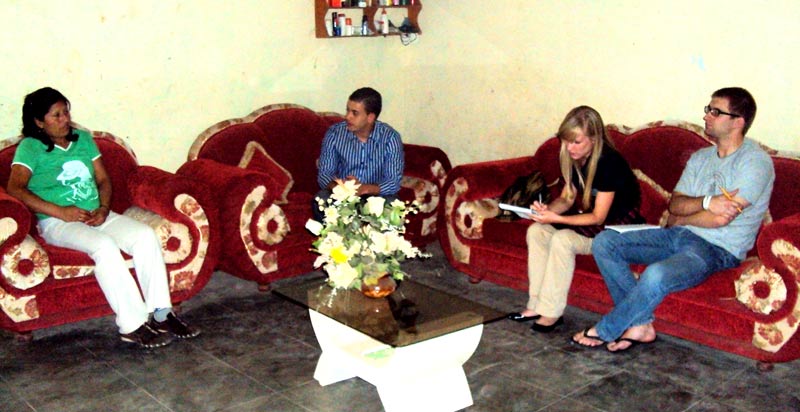Business students roll up their sleeves to assess Peru entrepreneurship
July 4th, 2010 Posted in OpinionBy Satenik Sargsyan
TRUJILLO, Peru—The USU business students participating in the Huntsman School’s South America Study Abroad Program started the Peru phase of their summer studies with a joint USU-Peru entrepreneurs initiative, the Small Enterprise Education and Development (SEED) program.
SEED is a micro-loan partnership program run by Utah State University and DanPer in Trujillo, Peru. It is specifically designed to provide the summer Huntsman students with the opportunity to evaluate “live” business plans for small entrepreneurs in Peru, said SEED program director David Herrmann.
“SEED is an evolutionary process which started with the first South America Study Abroad program in 2007,” Herrmann said. “Students were supposed to study the micro-financial institutions in Peru. After discussing this with then-Dean [Chris] Fawson, we concluded that it’s one thing to study and more fun to act. From an educational standpoint, SEED is the highlight of this trip.”
 Students are faced with a real-life experience to evaluate business plans and determine the level of potential success in the process of a due diligence project, Herrmann said. As a result of the project, they will categorize the business plans into three categories: Strongly Recommend, Recommend and Reject.
Students are faced with a real-life experience to evaluate business plans and determine the level of potential success in the process of a due diligence project, Herrmann said. As a result of the project, they will categorize the business plans into three categories: Strongly Recommend, Recommend and Reject.
“Anytime you do a live project, people are more focused,” Herrmann said. “Students are more motivated when they meet poor people with real needs. It’s one thing to give them money for their daily expenses and another to give them an opportunity to succeed in life.”
In a process of the due diligence project, students are encouraged to explore the applicants’ lifestyles, neighborhoods and current jobs to determine their competency to run a small business, Herrmann said.
“One challenge that has been clear to us even on Day 1 is the culture,” said finance and economics senior Brent Royal Crosby. “Our first interviewee showed up half an hour early while our second interviewee was an hour late.”
Along with advancing business-analytical tools, the project also gives the students enormous cultural insight about the day-to-day life in Peru that will be helpful for potential investors in the long term, Crosby said.
“This is a good way to show students how the rest of the world lives, so they will appreciate what they have,” Herrmann said. “They are introduced to a new system that does not allow them to have what we have, things we don’t think about.”
One of the challenges registering a business in a third-world country is the access to the legalization process. What takes 45 minutes of an online application in the United States may take months or sometimes years in South America, Herrmann said.
The final committee, consisting of Herrmann and three sponsors—Tim Barney, Blake Dursteler and Scott Davis—will have the last word in determining loan recipients.
“Previously we have approved five projects,” Hermann said. “Only one of them hasn’t worked out because of unforeseen reasons: the owners of a yogurt plant could not find a source of clean water near the plant.”
Herrmann said that the committee will approve approximately five more loans this year. USU employs two student interns in Trujillo each semester to educate small-business entrepreneurs in how to begin and maintain a business.
TP
Tags: Huntsman Business School, Peru, SEED, South America

Sorry, comments for this entry are closed at this time.